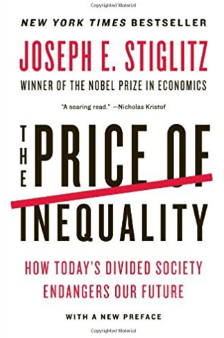I recently read “The Price of Inequality: How Today’s Divided Society Endangers Our Future” by Joseph Stiglitz. Below are the quotes I found most interesting. If you like the quotes, buy the book here.
 “In America the share of national income going to the top .01% (some 16,000 families) has risen from just over 1% in 1980 to almost 5% now – an even bigger slice than the top .01% got in the Gilded Age.” (xii)
“In America the share of national income going to the top .01% (some 16,000 families) has risen from just over 1% in 1980 to almost 5% now – an even bigger slice than the top .01% got in the Gilded Age.” (xii)
“Today, women in the United States, on average, have the lowest life expectancy of women in any of the advanced countries.” (xiii)
“Non-Hispanic white women with a college degree have a life expectancy that is some ten years greater than the life expectation of black or white women without a high school diploma.” (xiii)
“There was no reason to believe that giving more money to America’s wealthy would lead to more investment in the United States: money goes to where returns are highest, and with America’s downturn, returns often look higher for investments in the emerging markets. And even when there is investment in the United States, it’s not necessarily investment related to job creation: much of the investment is in machines designed to replace labor, to destroy jobs.” (xvi)
“The top 400 income earners in the United States paid an average tax rate of just 19.9 percent in 2009. Overall, the richest 1 percent of Americans pay effective tax rates in the low twenties, lower than those of Americans with more moderate incomes.” (xxvii)
“Some of the growth in inequality can be attributed to globalization and the replacement of semiskilled jobs with new technologies and outsourced labor.” (xxvii)
“Societies with more economic inequality tend to have more political inequality, especially when it reaches the outsize levels.” (xxviii)
“The chances of an American citizen making this way from the bottom to the top are less than those of citizens in other advanced industrial countries.” (xlv)
“For years there was a deal between the top and the rest of our society that went something like this: we will provide you jobs and prosperity, and you will let us walk away with the bonuses. You all get a share, ven if we get a bigger share. But now that tacit agreement between the rich and the rest, which was always fragile, has come apart.” (xlvii)
“The political system is more akin to “one dollar one vote” than to “one person one vote.” Rather than correcting the market’s failures, the political system was reinforcing them.” (1)
“Government policies have been central to the creation of inequality in the United States.” (7)
“In the mid-2000s, before the onset of the Great Recession, people in the bottom 80 percent were spending around 110 percent of their income.” (16)
“Some U.S. states spend as much on their prisons as they do on their universities.” (19)
“Money that is spent on “security” – protecting lives and property – doesn’t add to well-being; it simply prevents things from getting worse.” (19)
“Even as a myth, the belief that everyone had a fair chance had it uses: it motivated people to work hard. It seemed we were all in the same boat.” (25)
“Our hypothesis is that market forces are real, but that they are shaped by political processes.” (66)
“Imagine what the world would be like if there was free mobility of labor, but no mobility of capital. Countries would compete to attract workers. They would promise good schools and a good environment, as well as low taxes on workers. This could be financed by high taxes on capital.” (77)
“More than $3.2 billion was spent on lobbying in 2011 alone.” (119)
“Credit card companies would extract more money from transaction fees than the grocery store would profit from the sale of its goods.” (120)
“When inequality is as large as it is in the United States, it becomes less noticeable – perhaps because people with different incomes and wealth don’t even mix.” (185)
“If an individual believes what he has is a result just of his own efforts, he is less willing to share that wealth with others who he thinks chose to exert less effort. If an individual sees his success as a result largely of good luck, he is more willing to share that good fortune.” (199)
“In the great bailout of the Great Recession, one corporation alone, AIG, got more than $180 billion – more than was spent on welfare to the poor from 1990 to 2006.” (225)
“If debts can’t be discharged, or can’t be discharged easily, lenders have less of an incentive to be careful in lending – and more of an incentive to engage in predatory lending.” (242)
Liked the quotes? Buy the book here.

